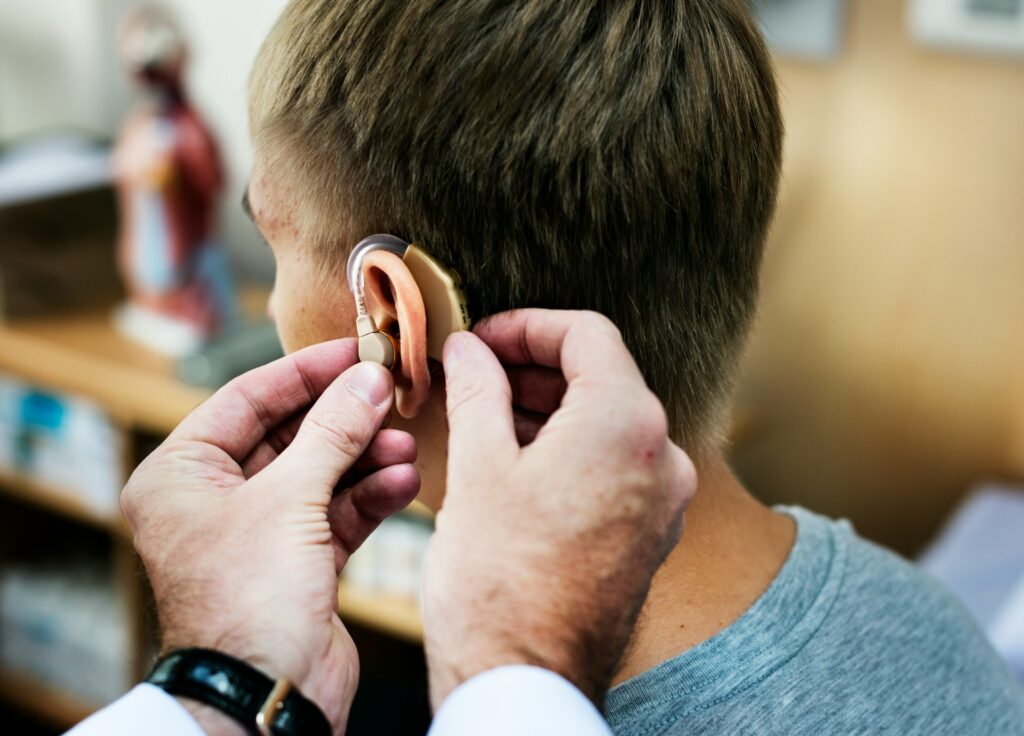It’s important to keep track of your hearing health. Over time, we may experience gradual changes in our ability to hear, which can significantly impact our quality of life. Recognizing when you might need a hearing test is crucial for timely intervention and effective management of any hearing issues. Regular hearing tests can help you understand your hearing abilities and catch potential problems early.
Hearing loss can sneak up on us slowly, making it difficult to notice until it affects daily activities. Sometimes, family and friends might pick up on these changes before we do. Simple tasks like having a conversation in a noisy place or listening to the television may become challenging. Our aim is to help you understand the common signs of hearing loss and when it’s essential to get a hearing test.
We can take proactive steps towards maintaining good hearing health. Knowing signs of hearing deterioration and understanding the importance of regular check-ups can safeguard against potential hearing loss. By doing so, we can ensure a better quality of life and avoid the complications that come with untreated hearing issues.
Recognizing Common Signs of Hearing Loss
Hearing loss can manifest in various ways, and recognizing the early signs is key to taking action. One common symptom is difficulty understanding conversations, especially in noisy environments. You might find yourself asking people to repeat themselves often or misunderstanding what they say. This can be frustrating and may lead to avoiding social situations.
Another sign of hearing loss is turning up the volume on your TV or radio louder than usual. Family members or friends might comment on how loud the volume is, even though it seems normal to you. Ringing or buzzing in the ears, known as tinnitus, can also be an indicator of hearing issues. If you experience tinnitus frequently, it could be a sign that your hearing is not as good as it used to be.
Pay attention to your ability to hear high-pitched sounds, such as the doorbell, phone ring, or birds chirping. Difficulty hearing these sounds may suggest high-frequency hearing loss. If you notice any of these signs in yourself or a loved one, it might be time to consider a hearing test to evaluate your hearing health.
Situations Where a Hearing Test Is Essential
Certain situations make it especially important to get a hearing test. If you work in a noisy environment, such as construction or manufacturing, regular hearing tests are crucial. Consistent exposure to loud noise can damage your hearing over time, so monitoring your hearing health is essential for early detection of problems.
Experiencing sudden hearing loss is another situation where immediate testing is necessary. Sudden hearing loss can be alarming and might indicate an underlying medical issue that needs prompt attention. In such cases, seeking a hearing test quickly can help determine the cause and appropriate treatment.
If you are over the age of 60, annual hearing tests are recommended even if you don’t notice any problems. Age-related hearing loss is common and can develop gradually, making it difficult to detect without a professional test. Regular hearing exams can help you stay on top of your hearing health and address any issues before they worsen.
The Impact of Untreated Hearing Loss on Daily Life
Untreated hearing loss can significantly affect our daily lives. One major impact is on communication. Difficulty hearing can lead to misunderstandings and frustration during conversations. This can strain relationships with family, friends, and coworkers. People with untreated hearing loss might withdraw from social activities because they find it challenging to participate in group conversations or noisy environments.
Another consequence of untreated hearing loss is its effect on mental health. Struggling to hear can lead to feelings of isolation and loneliness. Over time, this can contribute to anxiety and depression. Additionally, there is evidence that untreated hearing loss is associated with cognitive decline. Regular hearing checks and proper treatment can help mitigate these risks and maintain a higher quality of life.
How to Book and Prepare for a Hearing Test in 2024
Booking a hearing test in 2024 is easier than ever. Start by researching local hearing care providers and reading reviews to find a reputable clinic. Once you choose a clinic, call or visit their website to schedule an appointment. Most providers offer flexible scheduling options to accommodate your needs.
Preparing for a hearing test is simple. Here are a few steps to follow:
- Make a list of any hearing issues you have noticed, including when they started and any situations that make them worse.
- Note any medical history related to hearing, such as ear infections or tinnitus.
- Bring a list of medications you are currently taking, as some drugs can affect hearing.
- Avoid loud noises for at least 24 hours before your test to ensure your ears are in the best condition.
By preparing in advance, you can ensure a thorough and accurate evaluation of your hearing health.
Final Thoughts
Recognizing when you need a hearing test is crucial for maintaining your auditory health. Identifying common signs of hearing loss, understanding situations where a hearing test is essential, and knowing the impact of untreated hearing loss can guide you in taking proactive steps. Regular hearing tests help catch problems early, providing opportunities for effective intervention and maintaining a higher quality of life.
Booking and preparing for a hearing test is straightforward, and with the right information, you can ensure a smooth and effective appointment. If you have noticed any signs of hearing loss or if you haven’t had a hearing test recently, consider scheduling one this year.
For professional hearing care services, contact Country Hearing Care. Our experienced team is here to help you maintain your hearing health. Visit our website or call us to book an appointment today.










